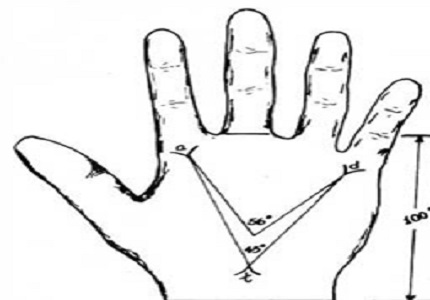Dermatoglyphics patterns in patients suffering from primary amenorrhea and control population
Abstract
Background: Dermatoglyphics is branch of medical science, which deals with the study of epidermal ridges and their configuration on the palmer region of hand and finger and planter region of foot and toes. Inspection of skin ridges provide a simple, inexpensive means of information to determine whether a given patient could have a particular chromosomal defect. Amenorrhea is defined primary when menarche does not occur by the age of 16 years in a girl with complete secondary sexual development. In the present study an attempt has been made to correlate primary amenorrhea and dermatoglyphics.
Method: 40 normal females with primary amenorrhea were taken as case and 40 normal females with normal menstrual cycle were taken for study. Dermatoglyphic prints were obtained using ink method.
Result: The mean value of atd angle shows statistically significant increase in patients than that of controls. Frequency of thenar/ ID1 pattern, ID2area, ID3area, IDarea in a both right and left hands of primary amenorrhea patients and in control is insignificant. Similarly, there is increased frequency of hypothenar area pattern in patients as compared to controls in left hand, which is found to be statistically significant.
Conclusion: Primary amenorrhoea and Dermatoglyphics, both have the suspected multifactorial (genetic and environmental) aetiologies. Dermatoglyphics, due to their suspected genetic aetiology. use for prognosis of disease and also the identification of people with the genetic predisposition to develop certain disease or early onset of symptoms.
Downloads
References
Gibbs RC. Fundamentals of dermatoglyphics. Arch Dermatol. 1967 Dec;96(6):721-5.
Sadler TW. Integumentary system. In: Langman’s Medical embryology. 11th ed.Philadelphia, USA: Lippincott Williams and Wilkins; 2010. p. 346.
Mulvihill JJ, Smith DW. The genesis of dermatoglyphics. J Pediatr. 1969 Oct;75(4):579-89.
Cummins H, Midlo C. Fingerprints, Palms and Soles: An Introduction to Dermatoglyphics; Dover Publications Inc: New York, NY, USA, 1961.
Sridevi NS, Delphine Silvia CR, Kulkarni R, Seshagiri C. Palmar dermatoglyphics in carcinoma breast of Indian women. Romanian Journal of Morphology &Embryology. Romanian Journal of Morphology &Embryology. 2010;51(3):547-50.
Meenakshi S, Balasubramanyam V and Rajangam S. Dermatoglyphics in amenorrhea- qualitative analysis. J Obstet Gynecol of India. 2006;56(3):250-54.
Practice Committee of American Society for Reproductive Medicine. Current evaluation of amenorrhea. Fertil Steril. 2008 Nov;90(5 Suppl):S219-25. doi: https://doi.org/10.1016/j.fertnstert.2008.08.038.
Reed T, Meier R. Taking dermatoglyphic prints – a self instruction manual. Sponsored by the American Association of Dermatoglyphics. 1990.
Ellor CS. Dermatoglyphics in schizophrenia. I. Qualitative aspects. Br J Psychiatry. 1968 Nov;114(516):1387-97.
Holt SB. Epidermal ridge-counts. Coll Antropol. 1979; 3(1):97–106.
Cummins H, Midlo C. Fingerprints, Plams and soles. An introduction to dermatoglyphics. Philadalphia. Blakiston.;1949.
Temtamy S, Mckusick VA: Synopsis of hand malformations with particular emphasis on genetic factors.In Bergsma D(ed):”Limb malformation” White Plains.NY The National Foundation-March of Dimes.BD:OAS; 1969; 5(3): 125-184. (S)
Mutalik GS, Lokhandwala VA, Anjeneyulu R. Dermatoglyphical findings in primary amenorrhea. J Obstet Gynecol of India .1968;18:738-43.



 OAI - Open Archives Initiative
OAI - Open Archives Initiative


